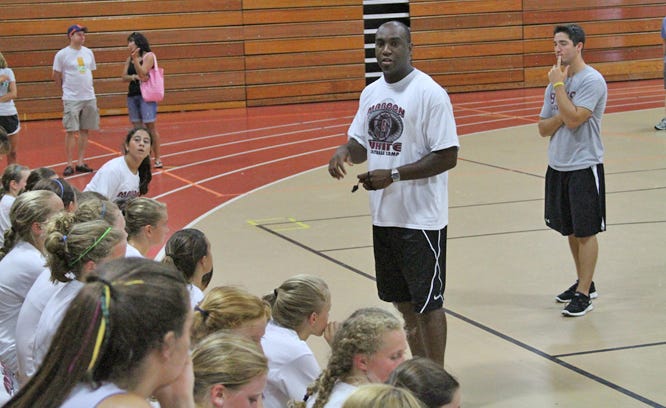“Indoor track” was normally a bit of a misnomer. We did run our meets indoors, at the Bubble in Toms River, but we typically practiced outside.1

Sometimes, mercifully, it was too cold, and our coaches would adapt. The gym at Red Bank Regional High School had a distinctive “90s fieldhouse” feel to it. There were bleachers that folded out from the walls, a couple of side-by-side, 3/4 length basketball courts, and a very small track running around the perimeter of the courts.
When I say small, I mean tiny. A typical outdoor track is 400 meters, or about a quarter mile. A typical indoor track is 200 meters. RBR’s indoor “track” was about 150 meters. This made replicating typical workouts difficult, since doing a set of 500 meter dashes (one of Coach B’s favorite methods of torture) was something like 3 1/3 laps inside.
For the longest distance runners, the small track was not a huge issue. I remember Jason, who was our designated 2-miler when I was a freshman. At every meet, he had to race 3200 meters, or 16 laps at the Bubble. That’s some psychological shit, a race for crazy people who can go within themselves and do the same thing over and over for 10+ minutes straight. Anyway, for some of these indoor workouts, they’d just tell Jason to run 40 laps, or some similar ridiculous number. And he’d just nod and start running.
For everyone else, there’d be some finagling. There just wasn’t enough space for all of us to do normal workouts at the same time. So Coach B decided to install discipline drills.2
My understanding is that these are typically more of a football thing. We’d all line up in rows of eight-ish, all facing the same direction. B would blow his whistle and the front row would do a burpee. This would happen a few times, with different signals resulting in different exercises. Eventually, he’d blow a long whistle, the signal for the current front row to run hard around the track and get to the back of the line.
Every row would get a few turns at this. If someone in a given row messed up, that whole row would have to go longer. This was unpleasant.
Meanwhile, Jason would just be running laps, weaving through the rows. I think that the rest of us couldn’t decide whether we envied him or pitied him.
I remember doing these discipline drills a few times during the two years B was coach. On one occasion, we had been assigned homework a few days before.
He stood in front of the team, holding a thick stack of papers.
“Now, we’re going to have some extra cold weather the next few days. Might even end up inside. If you want to participate in practice that day,3 you need to show up having memorized this poem.”
With that, he held up a single sheet.
“You WILL be quizzed. If you aren’t prepared, we’ll see what happens.”
The cold day came. I was nervous. I didn’t have a lot of confidence in my ability to memorize something word for word, and having to do it under pressure seemed even scarier. Still, I was 14 and very straitlaced, so I had studied that sheet of paper on the bus throughout that week. I couldn’t even consider just ignoring the command.
Practice warm-ups proceeded normally. We all stretched and chatted. Jason got sent on his typical journey through hell. The rest of us lined up in rows. I think people assumed that the coach had forgotten about the poem after he blew the whistle the first time.
That is, until he began to walk amongst the runners. Coach B milled about, making little remarks and small talk here and there, all while the front row kept doing their burpees. He settled on one random teammate and asked them to recite the first line of the poem.
They botched the line.
Coach B blew the whistle and the front row stopped, panting. They’d been exercising for at least a minute straight.
“Today will be a ROUGH day if you all don’t even know the first line.”
This went on for a while. Turns out that none of us really knew the poem that well.4 This man was fuming. I think that he was hoping that the exercise would be some kind of Remember the Titans thing that brought us all together, and it instead created the perception that the team wasn’t committed (which is an unfair perception, by the way).
Practice ended a little early, on a very sour note, and Coach B told us that that would not be the last time our team discussed the poem. So I studied it a lot more, but he never asked again. Brutal.
Anyway, to this day, I can still recite Invictus word for word.5 See for yourself:
Out of the night that covers me,
Black as the pit from pole to pole,
I thank whatever God may be,
For my unconquerable soul.In the fell clutch of circumstance,
I have not winced nor cried aloud.
Under the bludgeonings of chance,
My head is bloody but unbowed.Beyond this place of wrath and tears,
Looms but the horrors of the shade.
And yet the menace of the years,
Finds and shall find me unafraid.It matters not how strait the gate,
How charged with punishment the scroll.
I am the master of my fate,
I am the captain of my soul.
I’ve written a few times about how I realized in college that proactivity is a skill which can be learned and developed. Fundamentally, this stems from the fact that I believe that discipline is a skill which can be learned and devevloped.
Am I endorsing torturous discipline drills? No, that shit sucks.
At the same time, in January 2013, I ran a 68-second 400 meter dash. In May 2016, I ran a 52-second 400 meter dash.

Yes, I grew taller, went through puberty, and benefitted from years of weightlifting and running six days a week.
I also learned the truth about the 400, which is that it is pure pain. I was coached to sprint out of the blocks, run very fast along the back stretch, and build up to a full sprint again around the second turn. The more time I spent sprinting, the better. The faster I could be when I wasn’t sprinting, the better.
The races were devastating. The workouts to prepare for those races were devastating. But there was satisfaction, camaraderie, and lots of Type 2 fun.
It’s not like I was running races, reciting Invictus to myself, but the words rang true. I am the Master of my fate, I am the Captain of my soul. Maybe I was deluding myself, but there was a freedom in choosing to stick it through. Every time I finished an impossible workout, I proved to myself that I was the arbiter of my own abilities.
I wasn’t entirely sure I remembered Invictus, but, as soon as I started type it, the words poured out. I’m glad. This poem is a memento of the experience which built the foundation fro the person I am today:
Running made me into an athlete (at least for a little while). It made me confident that I could do difficult things and compete with people who seemed more talented.
It packed my schedule and showed me that I was capable of managing my time and balancing my priorities.
Most important, it showed me how quitting and failure feel. They feel really fucking bad. The few times I quit on workouts and races disgusted me so much that I still can’t let them go.
So, if you’ve ever struggled with discipline or motivation, read Invictus once or twice. Maybe even memorize it - if you can do that, who knows what else you’re capable of?
Gloves, hats, and many layers were essential pieces in any gym bag.
A brief word about Coach B - he was a skilled athlete, a very motivational coach, and a crazy person. My first season was his first season coaching. I guess he was popular at the school because too many kids joined (like 120). He didn’t want to accommodate that crowd so he made the first two weeks’ practices so insanely hard that a third of the team quit.
The man was full of multitudes. One day he’d tell me how much I was improving and that he was proud of me. The next I’d be declared the Team Treasurer (on account of the Judaism). One day he’d be laying into us about how summer workout plans. The next he’d be fired for allegedly texting girls from the school behind his wife’s back. Multitudes.
Running is more than a bit masochistic when you get down to it.
I don’t remember if I was quizzed, to be honest.
If this sounds familiar, it’s because the poem is famous. Originally written by William Earnest Henley, it was said to have inspired Nelson Mandela, with a film about South Africa eventually taking the poem’s name.



Incredible poem — impressed that you still have it memorized. I’m good with memorizing numbers (knew pi to 100+ digits at one point) but not so much words. I could never get the pledge of allegiance down.
I feel like your athletic background says a lot about you/your discipline. Also, wtf is up with Coach B!? Bro is wild. 🫣